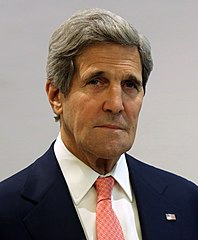
In recent months, some politicians have questioned the value of free speech. A notable example is John Kerry in his recent statement that “if people only go to one source, and the source they go to is sick, and, you know, has an agenda and they’re putting out disinformation, our First Amendment stands as a major block to be able to just, you know, hammer it out of existence. So what we need is to win the ground, win the right to govern by, hopefully, winning enough votes that you are free to be able to implement change.”
Let’s examine this statement. He begins by describing, but not identifying, an information source that is “sick,” has an “agenda,” and puts out “disinformation.” Clear implication: these are the bad guys. Next, he posits that the First Amendment that guarantees free speech is a “major block” to eliminating the sick source. He then shifts to the good guys who can solve this problem: the politicians who “win enough votes” to “be free to implement change.” He doesn’t say which political party he is referring to, but obviously it is his own Democrat party. Note the irony here—he is proposing that a single political party have the freedom to control the freedom of everyone else, indeed to “hammer” their freedom “out of existence.” Obviously, this proposal would effectively eliminate any opposition to his political party’s present and future agendas.
Does Kerry’s proposal put his Party above both the American people and their Constitution? I believe the Founding Fathers would say it does. Thomas Jefferson certainly would. As the Constitution Center notes, “Jefferson emphasized that it’s crucial in a democracy for citizens to be able to criticize public officials because legislators and religious leaders, ‘being themselves fallible and uninspired,’ will always try to impose ‘their own opinions and modes of thinking’ on others.”
Moreover, as the CEO of the National Constitution Center, Jeffrey Rosen explains, both Thomas Jefferson and Supreme Court Justice Louis Brandeis “believed that freedom to think as you will and to speak as you think are means indispensable to the discovery and spread of political truth; that without free speech and assembly discussion would be futile; that with them, discussion affords ordinarily adequate protection against the dissemination of noxious doctrine; that the greatest menace to freedom is an inert people; that public discussion is a political duty; and that this should be a fundamental principle of the American government.”
The danger is that the viewpoint Kerry expressed, and many other politicians share, will outweigh the views of our Founding Fathers and lead to the curtailing of free speech. After all, the Founding Fathers no longer have podiums, while today’s politicians have access to the media and thus can be heard by large audiences, especially if they have impressive portfolios.
In John Kerry’s case, he was a Yale graduate, served in the military, and was awarded three purple hearts, a bronze star, and a silver star. Some years later, he also received the Presidential Medal of Freedom. He served as Lieutenant Governor of Massachusetts and was a member first of Congress and then of the U.S. Senate. In addition, he was a candidate for President of the United States and later served as a U.S. diplomat. That kind of background can gain considerable respect and innumerable followers who tend to embrace ideas without first examining them critically and considering opposing views. For such people, it is helpful to address the errors in Kerry’s view:
1 Kerry’s implication that there is only a single information source to be concerned about is patently false. Now more than ever, there are many sources. The greatest number of them—the “legacy” or “mainstream” media”—have a liberal agenda which they are inclined to advance with misinformation. Though Kerry wants them protected, in reality it is the minority that needs protection from them.
2 Kerry apparently believes that only conservatives pose a danger to the country; in other words, that liberal progressives are magically spared from having “agendas” and spreading “misinformation.” He somehow fails to grasp that all humans are prone to moral imperfection. Jefferson knew better, and that knowledge led him to say that leaders are inclined to impose “their own opinions and modes of thinking” on others and that freedom of speech is necessary to guard against such abuse. Human nature has not changed since Jefferson made that observation.
3 Some will say that Kerry’s mistaken perspective on the first amendment reflects a conscious desire to undermine the U.S. Constitution, but I doubt that it does. I believe it instead reflects ignorance combined with arrogance, which is always a dangerous combination. He and many who share his perspective are simply convinced—without a smidgeon of evidence—that their beliefs are wiser and more beneficial to mankind than other people’s. They therefore feel compelled, for the good of the world, to “hammer” opposing ideas “out of existence.” But however powerful that feeling may be, the country cannot allow it to jeopardize our first amendment.
Copyright © 2024 by Vincent Ryan Ruggiero. All rights reserved.



